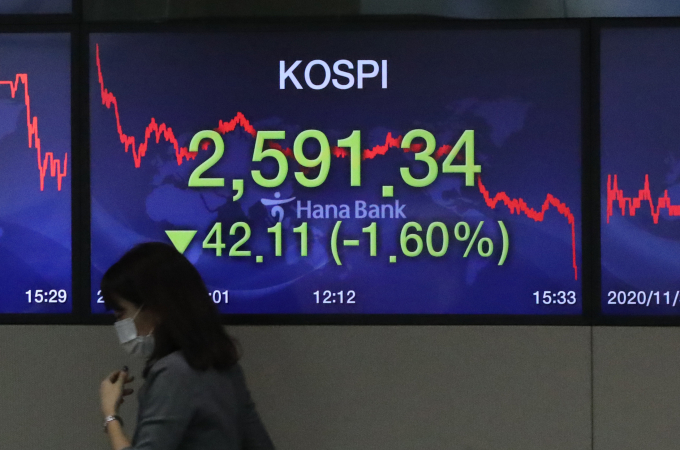Stock markets
Retail investor buying, foreign selling hit fresh highs on Kospi
By Nov 30, 2020 (Gmt+09:00)
2
Min read
Most Read
LG Chem to sell water filter business to Glenwood PE for $692 million


Kyobo Life poised to buy Japan’s SBI Group-owned savings bank


KT&G eyes overseas M&A after rejecting activist fund's offer


StockX in merger talks with Naver’s online reseller Kream


Mirae Asset to be named Korea Post’s core real estate fund operator



Foreign investors sold a record volume of shares on South Korea’s main bourse on Nov. 30, triggering a sharp fall in the main stock index, while individual investors scooped up a record amount, betting on further market gains in coming months.
The main Kospi index fell 1.6% to close at 2,591.34 points on Monday, after hitting an all-time high in the previous session, as foreigners sold a net 2.4 trillion won ($2.2 billion) worth of stocks, the largest amount on record.
By contrast, retail investors picked up a record amount of 2.2 trillion won, providing support for the local market, which has long been swayed by foreign investors’ trading patterns. Institutions purchased a net 202 billion won.
Monday’s heavy foreign selling was triggered by the changes in the MSCI Emerging Market Indices. As a result of the changes, South Korea’s weight has fallen to 11.7% from 12.0%, prompting global investors to reduce their Korean shareholdings. Instead, global index provider MSCI newly added Kuwait to its emerging market category.
Analysts said foreigners also sold Korean shares to take profit from recent gains. Before Monday’s heavy selling, foreign investors had bought 376.1 billion won worth of shares a day on average for nearly a month.
"The Kospi has risen too fast in a short period of time. Today’s fall is more like a technical correction triggered by global passive funds tracking major indices of key markets,” said Jung Yeon-woo, head of research at Daishin Securities.

Individual investors, however, have aggressively purchased local stocks believing that the Kospi, trapped in a boxed range for years, will break above the current ceiling to reach 3,000 points as early as next year, analysts said.
ANTS’ GROWING INFLUENCE
The country’s retail investors, known as Ants, because of their insignificant individual shareholdings, have become the biggest buying force on local bourses since early this year, betting heavily on a recovery from the coronavirus-driven slump.
Buoyed by a deep retracement since the local market’s yearly low in mid-March and anxious not to miss out on further gains, the Ants have been actively buying shares dumped by foreign and domestic institutional investors, providing firm support for the Kospi and the tech-heavy Kosdaq indexes.
Write to Byeong-Hun Yang and Yun-Sang Ko at hun@hankyung.com
In-Soo Nam edited this article.
More to Read
-
 Shipping & ShipbuildingHanwha Ocean shares sink after KDB's sale of 4.2% stake
Shipping & ShipbuildingHanwha Ocean shares sink after KDB's sale of 4.2% stakeApr 29, 2025 (Gmt+09:00)
-
 EnergySouth Korea nears Czech nuclear deal; Doosan, related stocks fly high
EnergySouth Korea nears Czech nuclear deal; Doosan, related stocks fly highApr 25, 2025 (Gmt+09:00)
-

-
 Business & PoliticsSeoul, Washington agree on July tariff deal framework in '2+2' trade talks
Business & PoliticsSeoul, Washington agree on July tariff deal framework in '2+2' trade talksApr 25, 2025 (Gmt+09:00)
-

Comment 0
LOG IN


